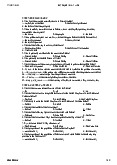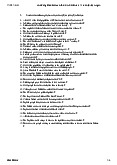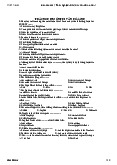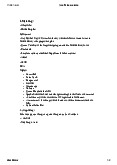









Preview text:
17:40 7/8/24 Văn hoá Anh (Auto Recovered)
ĐỀ CƯƠNG VĂN HOÁ ANH – (Prepared by HƯƠNG ANH) I. COUNTRY & PEOPLE
1. The largest island is: Great Britain
2. ‘Eire’ is also : Irish language name of the Republic of Ireland.
3. United Kingdom include 4 nations: England, Wales, Scotland and Northern Ireland
4. The smallest of 4 nations is: Wales
Identifying symbols of the four nations: about:blank 1/10 17:40 7/8/24 Văn hoá Anh (Auto Recovered)
5. The difference about origin ( The people in Ireland, Wales and
highland Scotland belonged to the Celtic race; those in England and
lowland Scotland were mainly of Germanic origin) was reflected in
the languages they spoke
6. The nations also tended to have different economic, social and legal systems.
7. What name is the UK flag often known: The Union Jack
8. ‘People in England’ is : People who love within the
geographical boundaries of England.
9. What proportion of the population of Britain lives in England: More than 80% 10.
The largest minority ethnic grouping in Britain: South Asian 11.
A surname beginning with ‘Mac’ or ‘MC is understood to be: Scottish or Irish 12.
In which of the following does a “Great Britain” team compete: The Olympics 13.
‘Lowland’ and ‘Highland’ related to: Scotland 14.
Of which country is Sr.David the patron saint: Wales 15.
Britain is located off the North-west coast of Europe.(known as The British Isles) 16.
The United Kingdom is comprised of : Great Britain and Northern Ireland 17.
The plant symbolizing Ireland is: Shamrock 18.
Britain = Great Britain + Northern Ireland 19.
The official full name of Britain is: the United Kingdom of
Great Britain and North Ireland. about:blank 2/10 17:40 7/8/24 Văn hoá Anh (Auto Recovered) 20.
A traditional skirt worn by Scottish men: Kilt ( The halp-
Wales/ Ireland; the bagpipes- Scottish) 21.
It is appropriate to call a citizen of the Britain. 22.
The figure of Britannia is the female embodiment of Britain. 23.
John Bull is a fictional character personifying Englishes. 24.
Polity: 2 political states consist of ( The Republic of Ireland,
the United Kingdom of Great Britain & Northern Ireland) II. HISTORY
1. Two spectacular examples of Wilt shire: Silbury Hill (the largest
burial mound in Europe) and Stonehenge.
2. Iron Age Celtic culture through-out the British Isles has been started for: 2000 years ago
3. Stonehenge is : A prehistoric monument
4. Magna Carie is : A historic document
5. Hadrian’s Wall (was built by the Romans in the second century
across the northern border of their province of Britannia- protect
form acttacks by the Scots and the Picts) is : On the English- Scottish border.
6. The roman province of Britannia covered most of present-day England and Wales
7. Hadrian’s Wall was built by the Romans in the 2th century.
8. Two of these tribes from the north-western European mainland invaded and settles were and the Angles the Saxons
9. Christianity spread throughout Britain from two different directions
during the sixth and seventh centuries 10.
Who won the Civil War in the 17th century: The Roundhead 11.
In what part of England is Wessex: The South-west 12.
Which of these place name is of partly Roman origin: Manchester about:blank 3/10 17:40 7/8/24 Văn hoá Anh (Auto Recovered) 13.
Which people settled in large numbers in Britain: The Anglo- Saxons 14.
Stonehange is a Prehistoric monument in England. 15.
What happened in EL in 1066:
- The last time England was successfully invaded - King of England was killed
- William the Conqueror became King of England 16.
King Harold was killed in the battle of Hastings 17.
The Roman gave the name of Britain to this country 18. The correct order of invasions to Britain: The
Roman( Roman period), The Celts, The Anglo- Saxons, The
Vikings(Germanic invasions), The Normans(Medieval period) 19.
The British legal system was formed on the basis of the
Anglo- Saxons concept of common law. 20.
The year the Roman are believe to come and stay in England: 43 AD 21.
The national festivals of Welsh songs and poetry is: Eisteddfods 22.
The word ‘Chester’ in Manchester means: Military camp 23.
The English class system started in: The Norman period 24.
The record of all the people and things in his country compiled by ( the conqueror) : William I The Domesday Book 25.
Monarch and Parliament got on quite well together because:
the monarch’s favorite politicians III. GEOGRAPHY
1. A special thing about the land and climate in Britain: have a notable lack of extreme
2. Britain has moutain , but none of them are very high, also has flat land. about:blank 4/10 17:40 7/8/24 Văn hoá Anh (Auto Recovered)
3. Britain have no active volcanoes
4. The climate of Britain is more or less the same as that the north
-western part of the Europe mainland.
5. The popular belief that it rains all the time in Britain: False
6. The amount of rain that falls on a town in Britain depends on: where it is
7. The winter are in general a bit colder in the east than the west
8. In the summer, the south is slightly warmer and sunnier than the north
9. There can be cold (even cold) day in July and some quite warm day in January 10. The
of the country is comparatively low- south and east lying 11.
Moutainous areas are found only in the north and west 12.
Much of land is used for: human habitaion 13.
75% people live in towns or cities rather than in villages or in the countryside 14.
What is mean of ‘smog’ => to describe a mixture of smoke and frog 15.
The least densely populated country in Britain: Scotland 16.
London is larger than any other cities in Britain. About how
much larger: Six time larger 17.
Brimingham in: the Midlands 18.
Manchester in: the North 19.
The largest city in Scotland: Glasgow 20.
What propotion of the population of London was born outside Britain: More than 30% 21.
Alternative most used in Britain: Wind power 22.
Which nearest London: The Downs 23.
Areas of land where there are no towns or cities(the
opposite of ‘urban’) => Rural about:blank 5/10 17:40 7/8/24 Văn hoá Anh (Auto Recovered)
QUESTIONS FOR FINAL TEST
1. Based on what you have studied, write an overview of the
Prime Minister of Britain
The prime minister of the Britain is the head of government of the
Britain. The Prime Minister advises the sovereign on the exercise of much
of the royal prerogative, chairs the Cabinet and selects its ministers. The
office of Prime Minister is not established by any statute or constitutional
document, but exists only by long-established convention, whereby the
monarch appoints as prime minister the person who most likely to
command the confidence of the House of Commons. In practice, this is the
leader of the political party that holds the largest number of seats in the Commons.
2. Many MPs in modern times are experts in various fields of
government. Because of the complexity of modern government,
this is something which seems to be necessary. But it could be
said to have disadvantages, too. What do you think these
disadvantages are?
The complexity of modern government is not about making the life of
an MP easy. The great majority of MPs willingly shoulder long hours and
hard work. Demands on MPs have increased significantly in morden. The
number of Parliamentary Questions tabled, Early Day Motions put down
and the volume of correspondence from MPs to Government ministers
have all increased and more MPs are spending more time engaged in
committee activity. Constituency work has also expanded and the amount
of correspondence to MPs has mushroomed. Surveys confirm that MPs are
working longer hours than ever before.
3. To Britons, what are "national loyalties" ? How does this
concept differ from that of your country? about:blank 6/10 17:40 7/8/24 Văn hoá Anh (Auto Recovered)
- To Britons, "national loyalties" are emotional attachments for some
people living in England who call themselves Scottish, Welsh. But for
others, it goes a bit further and they may even join one of the sporting
and social clubs for ‘exiles’ from these nations.
- In Vietnam, loyalty to the nation is expressed in putting national
interests above personal interests, everyone fights together for the
national cause and can sacrifice to protect that independence. National
loyalty in Vietnam are also expressed in people's compliance with the law
under the leadership of a single party
4. What are some distinguishing features of the land in Britain?
The land in Britain has a notable lack of extremes. Britain has
moutains, but none of them are very high; it also has flat land, but you
cannot travel far without encountering hills, it has no really big rivers. It
has no active vocanoes, and an earth tremor which does no more than
rattle teacups in a few houses.
5. Why do you think the monarch still exists until now even
though the King/Queen does not have political power? Because:
While the monarch does not exercise direct political power, they do
have certain constitutional duties and ceremonial roles to fulfill. The
monarch symbolizes continuity and stability in the country's government
and institutions. Besides, The monarchy has a long history in the UK, and
it is deeply ingrained in the country's culture and traditions. The monarchy
is seen as a symbol of national identity and pride. In addition to, the
monarchy have possitive effects to Tourism, Economy, and Diplomacy.
Especially, The monarchy enjoys significant public support in the UK, with
polls consistently showing that a majority of Britons are in favor of retaining the monarchy. about:blank 7/10 17:40 7/8/24 Văn hoá Anh (Auto Recovered)
6. Why do people often say "An Englishman's home is his
castle"? Does the quote truly reflect the reality of housing in Britain? Why?
- Because: Almost everybody in Britain dreams of living in a detached
house that is a house which is a separate building. So, people often say
"An Englishman's home is his castle" to illustrates the desire for privacy
and the importance attached to ownership which seem to be at the heart
of the British attitude to housing.
- This quote is not truly reflect the reality of housing in Britain. Housing
in Britain today is a bit more varied than that. Plenty of them live in flats,
terraced houses, or rented places, where the whole castle vibe might not
hit as hard as it does with a big detached house
7. In what ways are British pubs different from typical cafés
and bars in your country? Difference Britain Vietnam s Design Charm Modern No two are ever the same Focus on sound, light and space Playgroun
Most British pubs are Familiar entertainment and d
family-friendly and even relax place for younger have a playground out back for the kids Drink Wine, beer, spirits, lager Beer, home-made rice about:blank 8/10 17:40 7/8/24 Văn hoá Anh (Auto Recovered) alcohol,… Food
BBQ, potato chips, biscult, Potato chips, fruitls, spring sausage rolls, pilaw, peanut,.. Closing 11.00p.m on weekdays Keep serving until the wee time and weekends(before) hours so long as revelers keep ordering
8. Could you explain the phenomenon known as 'inverted
snobbery' that is related to class division in British society? Is
there such a similar experience in your country?
- The phenomenon known as ‘inverted snobbery’ talk about people who
discribe themselve as working class while they can are in middle class
or other class, whereby middle class peple try to adopt working-class
values and habits because they believe that the working classes are in
some way ‘better’ than the middle class. There is not a similar experience in Vietnam
9. What are the similarities and differences in terms of
education between Vietnam and Britain (except Scotland)?
- Similar: Both Britain and Vietnam have State school: non-free paying
school >< public/Prive/independent institutions and schools:pay free -Differences: Content Britain Vietnam School system
State school: non-free paying school ><
Public/ Private/Indepent institutions and schools: pay free Compulsory Up to age 16 Up to age 16 about:blank 9/10 17:40 7/8/24 Văn hoá Anh (Auto Recovered) schooling Organization
Little central control or Too much central uniformity, control, lack of decentralization:3 decentraliation: 1 department department School life 5-day a week 6-day a week Aim
Learning for its ownsake Learning for particular practical purpose about:blank 10/10



